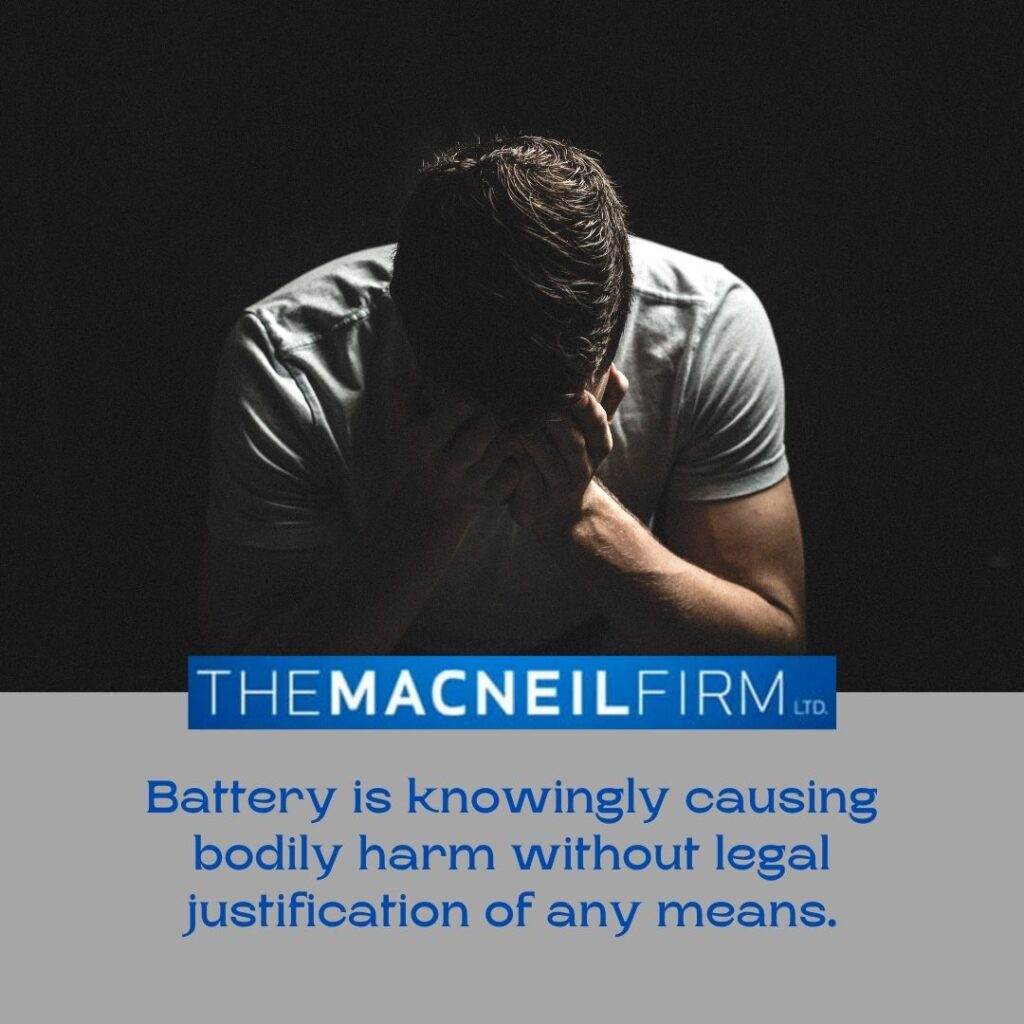If you’re facing assault or battery charges, it is best to hire an attorney to mount a strong criminal defense Illinois on your behalf. At The MacNeil Firm we have the experience and passion to protect you and your rights. We will do everything we can to make sure you can move forward with your future.
Many people wonder how intent factors into this type of charge. It would be difficult to prove, but that is why in Illinois the intent of the perpetrator, in other words the intent of the person committing the alleged offense is not a factor in assault or battery cases in Illinois.
How Does The Degree Of Injury Suffered Impact A Battery Charge?
The nature and severity of an injury is significant in both battery and aggravated battery charges. Although great bodily harm is not specifically defined, it can include permanent disability or disfigurement. Ultimately, it would be up to a judge or jury to determine whether the specific injuries in a particular case were severe enough to be considered what the statute defines as or refers to as great bodily harm.
For instance, would a bloody nose be considered great bodily harm? Probably not. What about a broken bone or some sort of injury that requires hospitalization? That probably would be enough to show great bodily harm. Ultimately, it is going to be up to a judge or jury. In some cases, whether injuries rise to that level is part of our criminal defense Illinois.
What Are The Potential Penalties For An Assault Or A Battery Conviction?
Assault is a Class C misdemeanor, this carries a maximum of thirty days in jail and a maximum of $1500 fine, but it does also carry a mandatory minimum thirty hours, up to one-hundred and twenty hours of community service. Assault is supervision eligible. Supervision is a special type of probation that does not result in a conviction on your record and is expungable if you complete all other supervision conditions, such as paying fines and costs and completing community service.
Aggravated assault is charged in a variety of ways, and can be anywhere from a Class A misdemeanor which would carry a maximum of one year in jail, up to a Class three felony, which carries up to a maximum of two to five years in prison.
Battery is a Class A misdemeanor. Class A misdemeanors carry a maximum of one year in jail, and a maximum of $2500 fine. Battery is also court supervision eligible, which means you could avoid a conviction, and expunge it if you complete all the terms.
Aggravated battery is a little bit more complicated. The minimum penalty for an aggravated battery is a Class three felony, which would carry a potential sentence of probation, and up to two to five years in prison, and it can go up from there. The Class three felonies are at the low end of the aggravated battery spectrum.
At the other end of the spectrum, the most serious aggravated battery offenses are Class X felonies that carry a minimum of six up to thirty years in prison and no option of probation. In addition, if a firearm was used, discharged, or caused great bodily harm, a judge could add fifteen, twenty, or twenty five years on top of the original sentence. Some of these aggravated battery cases where there is discharge of a firearm can carry very lengthy prison terms.
Because of the risk of long jail terms, anyone charged with aggravated battery should contact the MacNeil Firm to discuss options and strategies. It is important that you have a strong criminal defense Illinois to ensure you are pursuing the best legal strategy possible.
What Are The Potential Defenses Used In Assault And Battery Cases?
There are a variety of defenses available. I have successfully defended cases where the issue was whether the weapon used was a “deadly weapon”, or whether the bodily harm that was inflicted was “great bodily harm.” Also, justifiable use of force is a valid defense. This is what most people call self-defense. I have successfully defended individuals using self-defense theories. In addition to defending yourself, the use of force may be used in defending another person, and it may be used in defense of your dwelling or your property. However, you have to be careful because the amount of force used in a self-defense cases cannot exceed the amount of force that is being used in the threat.
In other words, you can only use that amount of force, which you reasonably believe that is necessary to defend yourself and others, or to prevent or terminate an unlawful entry into your dwelling. What this means is, if someone is trying to steal a rake from your garage, you cannot defend your property by shooting and killing them. Also, some states have enacted Stand Your Ground laws. Stand Your Ground laws eliminate the duty to retreat from a threat before using deadly force. Illinois has no Stand Your Ground law, but Illinois does not require a person to retreat from a threat before using force to defend themselves or others.
If you are facing assault or battery charges and need excellent criminal defense Illinois, contact The MacNeil Firm today. We will provide you with a free consultation and an honest assessment of your case.





